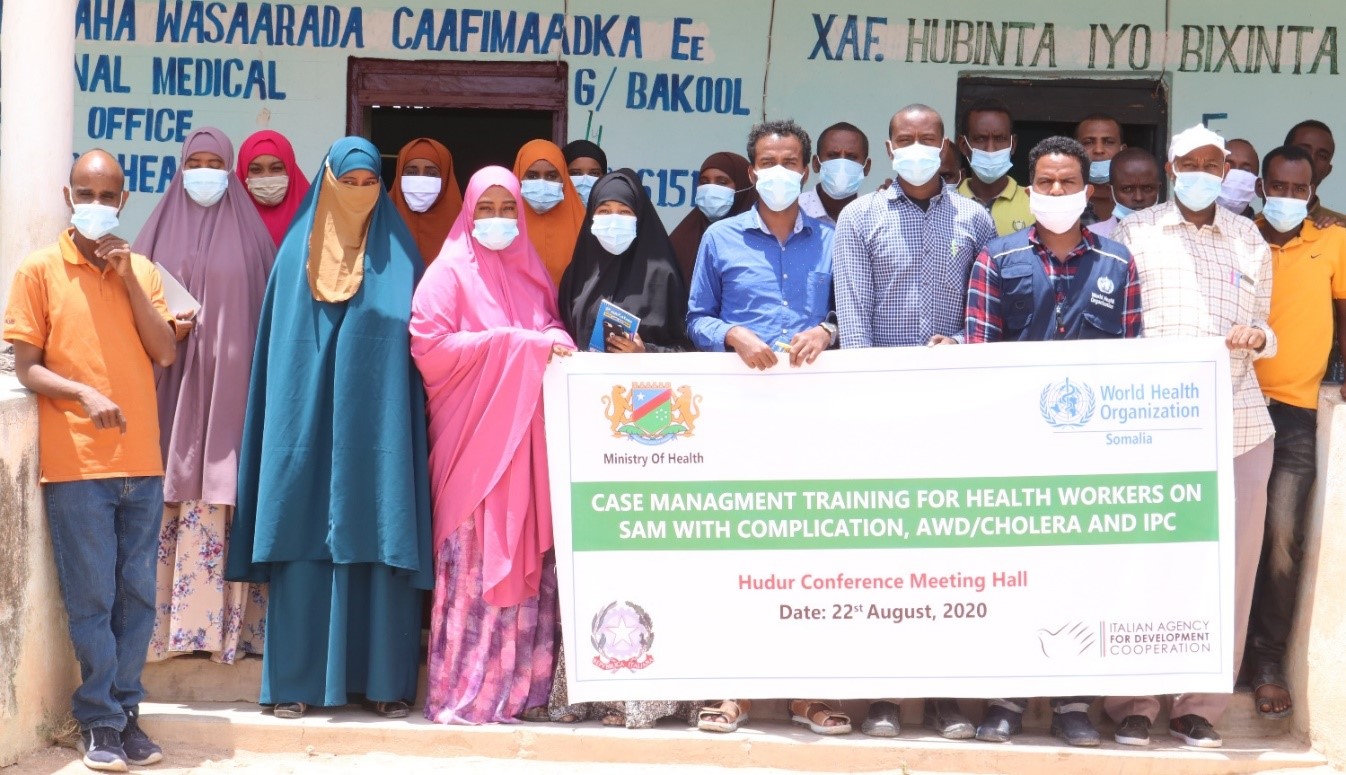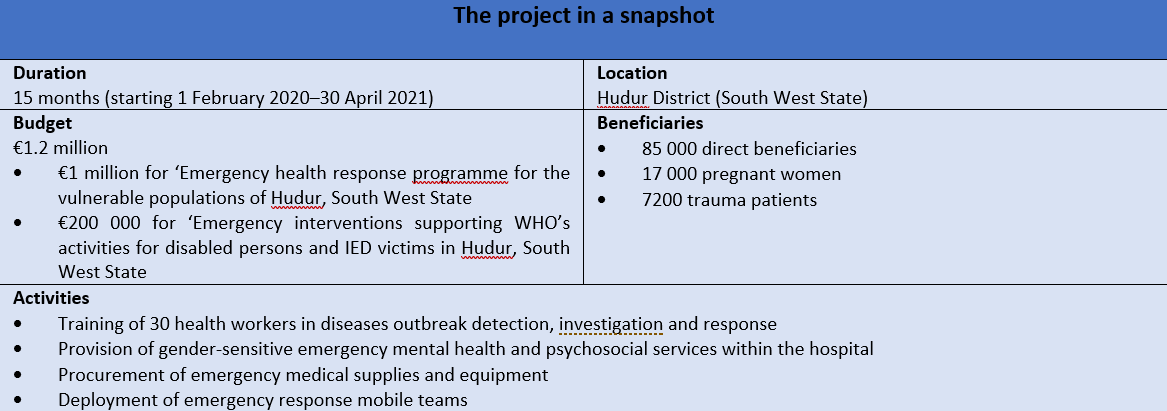 Case management training, Hudur Hospital, South West State, Somalia
Case management training, Hudur Hospital, South West State, Somalia
10 February 2020 – In 2019, a joint mission consisting of inter-cluster and inter-ministerial officials visited Hudur Hospital, located in the Bakool region of South West State – a drought-prone area, with a total population of 350 000 hosting 23 000 displaced persons. The mission identified access to emergency and trauma health care services as critical gaps, in particular for Hudur’s displaced population, which was found to be in need of immediate life-saving and integrated health and nutrition services. The mission also found that the hospital lacked: key medical equipment, including a proper operating theatre; sufficient human resources; a functional referral system linked to primary care facilities in the region; and capacity to address communicable diseases and provide adequate obstetric care. As the only referral hospital for the entire Bakool region, there is much to be done to improve this important facility.
It is against this backdrop that the WHO country office in Somalia developed 2 complementary projects, including the “Emergency health response programme for vulnerable populations of Hudur” and “Emergency interventions supporting WHO’s activities for people with physical disabilities and victims of improvised explosive devices (IEDs) in Hudur.” Together, these initiatives aim to provide lifesaving and integrated health and nutrition services to host communities and internally displaced persons (IDP), as well as support the provision of emergency obstetric and trauma care to pregnant women and other patients.
The projects also seek to support the construction of an outpatient unit, operating theatre and incinerator, as well as establish referral support for critical care, thereby creating linkages between primary and secondary health care facilities in Hudur town. To achieve this, WHO trained 30 health workers in disease outbreak detection, investigation and response, particularly through: use of the Early Warning and Response Network (EWARN) system; providing gender-sensitive emergency mental health and psychosocial services within the hospital; training health workers, youth and elders on de-stigmatization; procuring emergency medical supplies and equipment; and deploying emergency response mobile teams within Hudur and surrounding areas. WHO will also support the construction of an outpatient unit and operating theatre, hospital incinerator, installation of Solar Hybrid System as well as the development of rain water harvesting structures. Overall, the project targets 85 000 women and men in the host community and IDP camps, as well as 17 000 pregnant women and 7200 trauma patients.
The WHO expresses its sincere thanks to the Italian Agency for Development Cooperation for its generous support as part of these important projects and encourages other donors and partners to scale up support for Hudur Hospital, as the only referral hospital in the entire Bakool region.

For further details, please contact:
Mr Kyle DeFreitas
External Relations Officer
This email address is being protected from spambots. You need JavaScript enabled to view it.
 Case management training, Hudur Hospital, South West State, Somalia
Case management training, Hudur Hospital, South West State, Somalia
10 February 2020 – In 2019, a joint mission consisting of inter-cluster and inter-ministerial officials visited Hudur Hospital, located in the Bakool region of South West State – a drought-prone area, with a total population of 350 000 hosting 23 000 displaced persons. The mission identified access to emergency and trauma health care services as critical gaps, in particular for Hudur’s displaced population, which was found to be in need of immediate life-saving and integrated health and nutrition services. The mission also found that the hospital lacked: key medical equipment, including a proper operating theatre; sufficient human resources; a functional referral system linked to primary care facilities in the region; and capacity to address communicable diseases and provide adequate obstetric care. As the only referral hospital for the entire Bakool region, there is much to be done to improve this important facility.
It is against this backdrop that the WHO country office in Somalia developed 2 complementary projects, including the “Emergency health response programme for vulnerable populations of Hudur” and “Emergency interventions supporting WHO’s activities for people with physical disabilities and victims of improvised explosive devices (IEDs) in Hudur.” Together, these initiatives aim to provide lifesaving and integrated health and nutrition services to host communities and internally displaced persons (IDP), as well as support the provision of emergency obstetric and trauma care to pregnant women and other patients.
The projects also seek to support the construction of an outpatient unit, operating theatre and incinerator, as well as establish referral support for critical care, thereby creating linkages between primary and secondary health care facilities in Hudur town. To achieve this, WHO trained 30 health workers in disease outbreak detection, investigation and response, particularly through: use of the Early Warning and Response Network (EWARN) system; providing gender-sensitive emergency mental health and psychosocial services within the hospital; training health workers, youth and elders on de-stigmatization; procuring emergency medical supplies and equipment; and deploying emergency response mobile teams within Hudur and surrounding areas. WHO will also support the construction of an outpatient unit and operating theatre, hospital incinerator, installation of Solar Hybrid System as well as the development of rain water harvesting structures. Overall, the project targets 85 000 women and men in the host community and IDP camps, as well as 17 000 pregnant women and 7200 trauma patients.
The WHO expresses its sincere thanks to the Italian Agency for Development Cooperation for its generous support as part of these important projects and encourages other donors and partners to scale up support for Hudur Hospital, as the only referral hospital in the entire Bakool region.

For further details, please contact:
Mr Kyle DeFreitas
External Relations Officer
This email address is being protected from spambots. You need JavaScript enabled to view it.
 Case management training, Hudur Hospital, South West State, Somalia
Case management training, Hudur Hospital, South West State, Somalia









